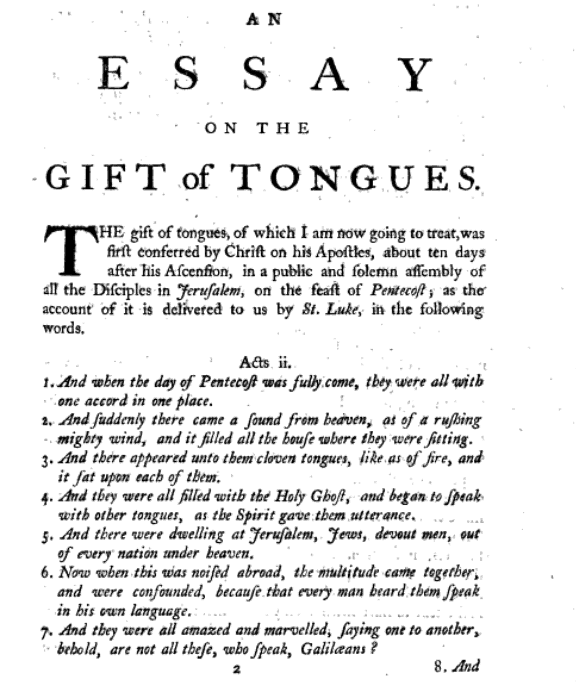Conyers Middleton’s Essay on the Gift of Tongues is an important later Reformation work on this subject. He dug deeper than most authors but did not reach paydirt. Nonetheless, there is good thinking going on here.
Greek
Technical Notes on Chrysostom's Pentecost Text
Notes on the translation of John Chyrsostom’s “On the Holy Pentecost” Homily 1:4(b) to 5.
Basil of Seleucia on Pentecost: Notes
A brief analysis of the fifth century tongues of Pentecost text loosely attributed to Basil of Seleucia
Basil of Seleucia Authorship Correction
Finding the real authorship and date behind a text loosely attributed to John Chrysostom.
John of Damascus on Tongues: Notes
Notes on on the John of Damascus text as it relates to the christian dogma of tongues.
John of Damascus on Tongues: The Greek Text
Greek snippets from John of Damascus’ Commentary of I Corinthians as it relates to the dogma of tongues
Origen on Tongues: the Source Texts
The source texts of Origen’s writings concerning the christian dogma of tongues
Origen on Knowledge
A helpful guide for anyone reading Origen and getting stumped over his semantically diverse theories of knowledge.
Many historians and academics rank the third-century Christian theologian and thinker, Origen, as one of the best earlier Christian writers. He was steeped in Greek literature, structure and thought. Not only this, but his zeal for knowledge was wrapped in sincere piety. These characteristics were reflected in his writings.
This combination is especially found in the catena ascribed to him on I Corinthians.1 One is hard-pressed to comprehend the semantics of his knowledge words. This applies to the majority of his other works as well.
As a reader and translator of Origen, one must have a precise understanding of the Greek system of knowledge. There are a number of words for knowledge in Greek and have different applications. Understanding these words in the original context is a gateway to Origen’s mind.
This article attempts to unlock the words of knowledge in order to better understand Origen’s text. The beginning is difficult and complex for the English reader to understand but the end is rather simple. Origen wanted to know things in such a way that changed his worldview and his interaction with it. Studying was not simply for the sake of knowledge but becoming a better, more complete person.
Anyways, we will get into the details of his concept of knowledge starting now.
The Language of Instruction in the Corinthian Church
A look at the ancient Jewish rite of instruction in Hebrew with an immediate translation into Aramaic or local vernacular. How it potentially impacted the earliest Corinthian assembly and how this rite evolved in the church.
The tradition of Jewish instructors speaking in Hebrew lasted for centuries. It is no longer practiced in synagogues today but was an important function in Judaism around the first-century. This little-known practice had an important part to play in the Jewish identity, and as will be shown, was a factor in the tongues conflict in Corinth.
In order to better explain this practice and make an association with the Corinthian gathering, we must go into ancient Jewish literature and examine citations from a number of prominent Jewish authorities. For those not familiar with Jewish writings outside the Bible, their observations are obscure on the first read and takes some contemplation.
The Public Reader, the Synagogue, and Corinth
A detailed look into the Jewish rite of reading, speaking, interpreting and how it relates to the Corinthian tongues controversy.
